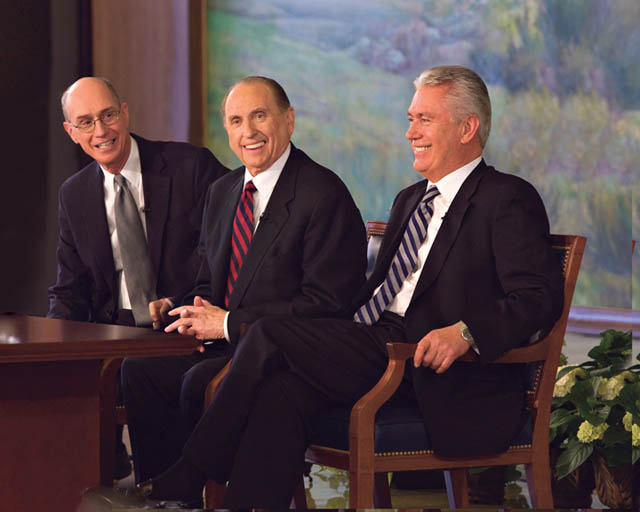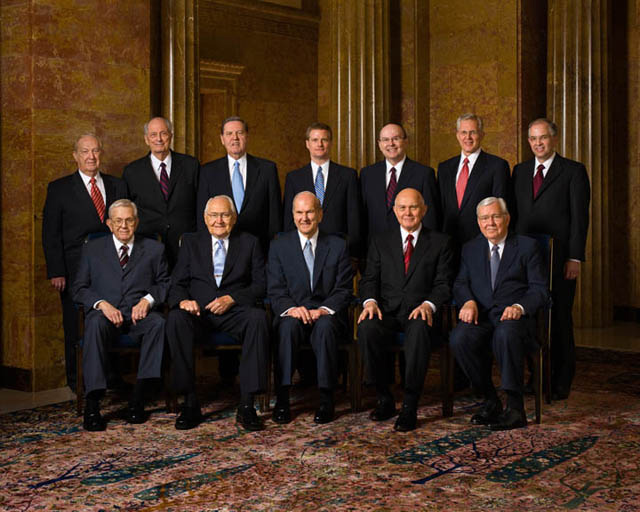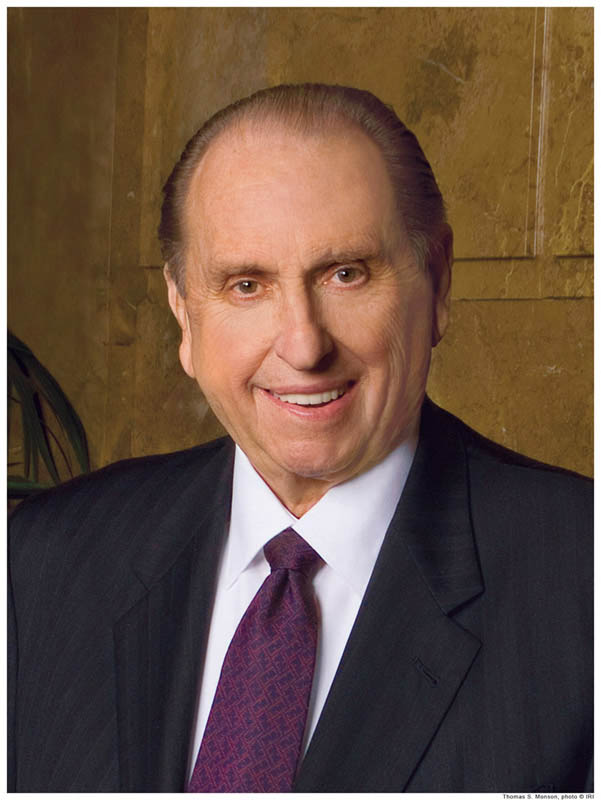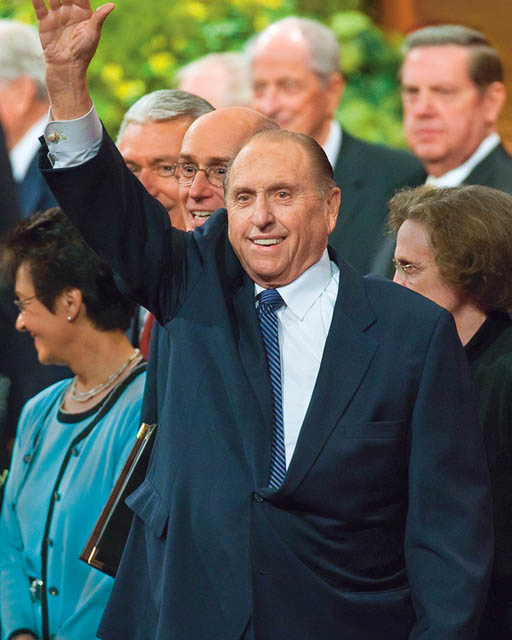This is the fourth installment in a series of articles on Mormon prophets. The series is based on a talk given by Ezra Taft Benson, who was then a Mormon apostle. In the article, he outlines Fourteen Fundamentals in Following the Prophet.
The third principle Elder Benson teaches is: The living prophet is more important to us than a dead prophet.
 Mormon beliefs teach that God did not retire to a back room and refuse to speak to us until we die. Although the world has, in the past, sometimes been without a living prophet due to apostasy, God has always returned the prophets when they were again needed. Can anyone look around at the world today and think a prophet is no longer needed? The second coming is nearing and, just as we needed a prophet to prepare for the first coming, we need one to help us prepare for the second coming. There are thousands of churches all teaching conflicting doctrine, even within similar denominations. (For instance, there are many, many Protestant churches, all with widely differing views.) It’s pretty clear people aren’t sure what is really true. Somebody needs the power to approach God and to receive revelation to help us be on the right track, and always, from the beginning of time, that person has been a prophet.
Mormon beliefs teach that God did not retire to a back room and refuse to speak to us until we die. Although the world has, in the past, sometimes been without a living prophet due to apostasy, God has always returned the prophets when they were again needed. Can anyone look around at the world today and think a prophet is no longer needed? The second coming is nearing and, just as we needed a prophet to prepare for the first coming, we need one to help us prepare for the second coming. There are thousands of churches all teaching conflicting doctrine, even within similar denominations. (For instance, there are many, many Protestant churches, all with widely differing views.) It’s pretty clear people aren’t sure what is really true. Somebody needs the power to approach God and to receive revelation to help us be on the right track, and always, from the beginning of time, that person has been a prophet.
There was not just one prophet sent to earth for all time. There was only one prophet at a time, but there have been a long series of prophets starting with Adam, who spoke to God. However, as we read the Bible we see that God didn’t just tell Adam everything there was to know and then stop sending prophets. Instead, throughout the Bible, we see a series of prophets, each teaching new things. They repeated past teachings but also added to the body of knowledge and sometimes gave unique teachings based on the needs of that time.
For example, Noah was told to build an ark. Adam wasn’t told to do that; neither was Moses. Why not? Because arks weren’t part of the needs of that time period. The people of Noah’s time needed their own living prophet to tell them to build the ark. Now, it’s true the people ignored the teaching of the living prophet and paid for this decision with their lives, but they had the opportunity to make a choice. Had there been no living prophet, that choice would have been denied them. Noah and his family did listen and were saved. Had prophets stopped after Adam, Noah would not have known to build an ark and the others would have been denied the right to repent if they chose. As you read the Old Testament, note how often the people were helped or saved by the words of a living prophet teaching something that had not been taught previously. This will demonstrate that God intended us, when we’re willing to listen, to have current living prophets. The Bible does not say God was finished with us after Jesus served his ministry. It does not say He would never talk to us again.
In the Old Testament, the people were taught not to commit adultery. Jesus did not change that because it is an eternal truth. However, he did add to it, including some higher level teachings, such as not looking at or thinking of someone in an inappropriate way. The words of Moses were not the final word on the subject.
Today, as in ancient times, there are again prophets on the earth because times are different now. Moses never addressed the internet or popular fiction or a variety of scientific developments because, naturally, they were of no value to his own people since they hadn’t even been invented yet. In the same manner, Joseph Smith could not address what is in today’s newspaper.
Sometimes we prefer dead prophets to living ones. “…the world prefers that prophets either be dead or worry about their own affairs,” Elder Benson said. In some of today’s battles over religion, we hear, “Well, there are lots of things in the Bible we don’t do anymore, so we don’t have to do this either.” In other words, choosing to believe only in dead prophets makes it easier to choose which commandments we want to keep. The others become “outdated” and “not for our time.” If a prophet is alive and speaking today, however, we cannot ignore that God meant that teaching for us today in our own time.
Mormons have a smooth transition between prophets. When a prophet dies, the president of the Quorum of the Twelve Apostles becomes the next prophet. The president is the apostle who has served the longest as an apostle. There is no need to vote or campaign. We know God will place each person in his proper order and that death will remove any who are not to serve as the prophet. This program leaves God entirely in charge. At no time is the Mormon Church without leadership. When a prophet dies, the First Presidency, consisting of the prophet and his two counselors, dissolves and the leadership of the church is turned over to the apostles, with the senior apostle leading them. Since he will be the next prophet, things run smoothly until the new prophet is officially called.
The dictate to follow a living prophet does not mean we never listen to the dead prophets. Mormons read the Bible and pay attention to the teachings of those who came before. They study the words of modern-day prophets who died in their classes at church. However, if a Mormon comes across a teaching by Brigham Young that interests him, he will first find out if Thomas S. Monson, the current prophet as of this writing, has said anything on the subject. If not, he will work backwards to find the most recent teaching on the subject. If they do not differ from what Brigham Young said, then the quote holds. Otherwise, they instead follow the teachings of the current prophet, who is assigned to watch over the church in our day. Truth doesn’t change, but practices do and so does our level of understanding.
We see this example even in the Bible. Jesus was the current prophet of His time. Of course, He was also much more than “just” a prophet, but He was the prophet. He often quoted scripture from other prophets, but from time to time he added new levels of understanding and new practices that were needed for that specific time. He left instructions for even more changes—such as the Last Supper sacrament—to be practiced after His death. Truth hadn’t changed, but some things previously done, such as animal sacrifices, were to help people prepare to understand the atonement of Jesus Christ that would come, and once it happened, that practice was no longer needed. We had the example of the actual Savior instead.
And so, although Mormons have many prophets, both ancient and modern, they always give priority to the person sent to teach them at that very moment, just as the people of the Bible did.
The late Terrie Lynn Bittner—beloved wife, mother, grandmother, and friend—was the author of two homeschooling books and numerous articles, including several that appeared in Latter-day Saint magazines. She became a member of the Church at the age of 17 and began sharing her faith online in 1992.





